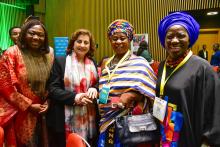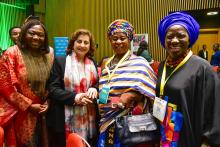UN Women Executive Director Sima Bahous conducted a three-day mission in Rwanda, where she represented the UN Secretary General at the Women Deliver 2023 conference in Kigali, and met with government officials, civil society, women’s rights activists and partners to strengthen collaboration and mobilize greater action for gender equality and women’s empowerment in Rwanda and at the global scale. Notable meetings included those with the President of the Republic of Rwanda, H.E. Paul Kagame and subsequent meetings with the Minister of Gender and Family Promotion, Prof. Jeanette Bayisinge and other members of the National Gender Machinery.
UN Women Executive Director visits Rwanda, applauds remarkable progress on gender equality and women’s empowerment
The Women Deliver conference, convened around the theme ”Space, Solidarity and Solutions”, witnessed participation from over 6,000 stakeholders and advocates dedicated to advancing gender equality, making it one of the largest multi-sectoral gatherings of its kind. At the opening ceremony, Rwandan President H.E. Paul Kagame, reaffirmed the country’s commitment to gender equality, and urged stakeholders to take innovative and urgent measures to accelerate progress.
As a country, Rwanda ranks among the highest globally on the achievement of gender parity, particularly in women’s political participation, with nearly two-thirds of parliamentary seats and 55 per cent of cabinet positions currently held by women. The Government of Rwanda has further demonstrated its commitment by co-leading the “Generation Equality” Action Coalition on Technology and Innovation, pledging to close the digital gender divide by 2026.
“Change is difficult and does not happen overnight, but together, with sustained effort, we can make a decisive difference,” said President Kagame.
Delivering remarks on behalf of the UN Secretary General, Ms. Bahous called upon Women Deliver participants and activists worldwide to stand steadfast amidst current challenges and recent regressions on women’s rights, and to unite to drive collective action for gender equality as the world looks forward to important summits such as the SDG Summit and the Summit of the Future.
Ms. Bahous further underscored UN Women’s dedication to collaborating with all stakeholders and empowering youth movements as key agents of change: “As multilateral organizations, government and the private sector, it is our duty and responsibility to create space for (youth) voices to be heard, and share the power we are privileged to hold,” she said. Read the full speech.
In a meeting with President Paul Kagame on the sidelines of the Women Deliver conference, Ms. Bahous commended the strong achievements Rwanda has made on advancing women’s rights and gender equality, and expressed gratitude to the country for hosting the global community of gender champions at the Women Deliver conference this year.
The Executive Director also held a bi-lateral meeting with the Minister of Gender and Family Promotion in Rwanda, Ms. Jeanette Bayisenge, and attended the Women Deliver Ministerial Forum organized by the Government of Rwanda. The Ministerial Forum, held on the first day of the conference, provided a unique platform for Ministers covering various sectors globally to come together, exchange experiences and recommit to implementing innovative programs in support of national and global efforts to realize gender equality across all aspects of society.
Speaking at the Forum, Ms. Bahous stressed the crucial role of accountability in advancing women’s empowerment, urging all countries to accelerate the implementation of gender equality commitments outlined in various frameworks.
A key engagement for the Executive Director at the Women Deliver conference was the Generation Equality Impact Fest held on 18 July. The side event provided a platform to showcase progress towards the realization of commitments made at the Generation Equality Forum in 2021, and to energize collective action ahead of the Midpoint Summit, which will be co-hosted by the Governments of Iceland and Tanzania on the sidelines of the UN General Assembly in September.
Ms. Bahous applauded Rwanda’s leadership in the Technology and Innovation Action Coalition and emphasized the urgency of achieving ambitious Generation Equality goals. “We are impatient. Our five-year timeline to see results that meet our ambitions is vital. This is why Generation Equality remains among my top priorities,” said Ms. Bahous, calling for stakeholders at all levels to use the Generation Equality Midpoint and other events such as the 2023 SDG Summit to heighten efforts towards the realization of gender equality.
The Women Deliver conference also witnessed the launch of the landmark report, ‘The Paths to Equal’ introducing two new gender indices – the Women’s Empowerment Index (WEI) and the Global Gender Parity Index (GGPI). These indices provide comprehensive insights into women’s human development, identifying areas where policy actions are urgently required to achieve gender equality, particularly in the areas of health policies, equality in education, work-life balance and support for families, women’s equal participation in public life, and violence against women.
At the launch, Ms. Bahous highlighted the crucial role of the gender indices represent in redefining how we measure and understand progress towards gender equality, shining a light on the complex challenges faced by women across the globe.
Ms. Bahous also participated in the launch of the The State of the World’s Fathers Report 2023 produced by Equimundo, which highlights that, although more fathers want to and are doing more care work than in the past, mothers still invest more time in the physical and emotional care of their children. Ms. Bahous advocated for stronger policies and workplace practices that promote gender equality and support the redistribution of unpaid care responsibilities within families.
While in Kigali, Ms. Bahous visited the Isange One Stop Centre (IOSC), which provides shelter and tailored holistic services to women and girl survivors of violence. With support from UN Agencies in Rwanda, including UN Women, the IOSC model was initiated as a pilot in 2009, providing comprehensive medical, legal, psychological, counselling, and forensic services for survivors. Today, there are 44 IOSCs operational across the country, with the government planning to scale up the services to Health Centers for increased proximity to the community.
Ms. Bahous also visited the Kigali Genocide Memorial, where she paid respects to the victims of Genocide against the Tutsi and toured memorial exhibits which document the Genocide and its aftermath.
The Executive Director also met key stakeholders in Rwanda, including senior government officials, women political leaders, development partners, representatives from the United Nations, private sector leaders and civil society organizations, at a dinner roundtable discussion facilitated by the UN Resident Coordinator, Ozonnia Ojielo. The dialogue served as a space for stakeholders to reflect on Rwanda’s gender equality journey thus far and to envision future action.
Concluding her mission, Executive Director Bahous made time to meet with staff, congratulating them for the work they do to support the government, the UN country team and other stakeholders towards the attainment of the results witnessed during her visit.

